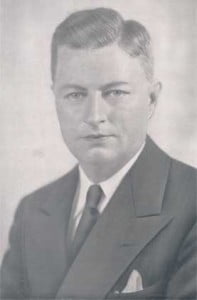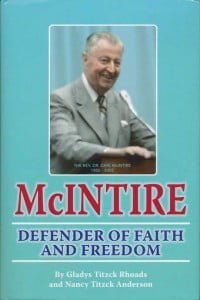For the Word of God and the Testimony of Jesus Christ
 The young Presbyterian minister had been called to candidate at Collingswood Presbyterian Church in the fall of 1933. That he had been just a few years out of seminary, and Westminster Seminary at that, didn’t seem to matter to the congregation in that New Jersey town. He had a few years experience as a pastor in an Atlantic City, New Jersey Presbyterian Church. But it was in Collingswood, New Jersey that Carl McIntire was to be a lighting rod during some very challenging years for that Presbyterian congregation. On September 28, 1933, he became the pastor of the Collingswood Presbyterian Church at Ferm Avenue in Collingswood, New Jersey.
The young Presbyterian minister had been called to candidate at Collingswood Presbyterian Church in the fall of 1933. That he had been just a few years out of seminary, and Westminster Seminary at that, didn’t seem to matter to the congregation in that New Jersey town. He had a few years experience as a pastor in an Atlantic City, New Jersey Presbyterian Church. But it was in Collingswood, New Jersey that Carl McIntire was to be a lighting rod during some very challenging years for that Presbyterian congregation. On September 28, 1933, he became the pastor of the Collingswood Presbyterian Church at Ferm Avenue in Collingswood, New Jersey.
Seeing his conservative leaning in regard to the great issues of the gospel, J. Gresham Machen invited him to join the board of the fledgling Independent Board for Presbyterian Foreign Missions, which McIntire did in 1934. That same year, the General Assembly of the denomination met and issued a directive or mandate to all ministers, churches, and presbyteries of the church. In essence this mandate said that anyone who was affiliated with this independent agency had ninety days to desist from participation in or support of the agency, or face the consequences of discipline by their respective presbyteries.
Carl McIntire was charged with six counts of error by his Presbytery, but found guilty on only three of those charges. These three were: 1. defiance of the government and discipline of the denomination, 2. unfaithful in maintaining the peace of the church, and 3. violation of his ordination vows. He was convicted of sin and suspended from the ministry. McIntire’s case was appealed to the PCUSA General Assembly of 1936, and that Assembly sustained the action of the Presbytery of West Jersey.
On March 27, 1938, after the Sunday evening service, the congregation stood on the front lawn of the church and sang two hymns of the faith. The first was “Faith of Our Fathers,” followed by “Savior Like a Shepherd Lead Us.” And with that, they left the church, giving up the property, the memories, and all their associations with their former denomination. The very next Sunday, the newly formed Bible Presbyterian Church of Collingswood, New Jersey, met in a huge tent. Present were 1200 people, with eighty-one new members joining the new church at that first Sunday’s worship.
Charles Curtis McIntire, Jr., called Carl from childhood, was born on May 17, 1906. He took his higher education at Southeastern Oklahoma State University, Park College (in Parkville, Missouri), Princeton Theological Seminary and Westminster Theological Seminary. McIntire was ordained in 1931 and installed as pastor of the Chelsea Presbyterian Church in Atlantic City, New Jersey. Two years later, in 1933, he answered a call to serve the Collingswood church. After a long life of many accomplishments and not a little controversy, Dr. McIntire died on March 19, 2002, at the age of 95.
Words to Live By:
We close today’s post with a few paragraphs from the opening of a sermon by the Rev. Carl McIntire, delivered before the National Society of Magna Charta Dames, in Philadelphia, June 4, 1946. [The Magna Charta Dames are descendants of the barons who secured from King John, on June 15, 1215, at Runnymede, the Magna Charta. This charter forms the basis of all our English and American civil liberties.)
The State’s Responsibility Under God to Maintain Freedom
America is in greater danger of losing her freedom today than at any time since the Declaration of Independence. We have just won a war to destroy the idea of the all-powerful State, but we are turning to an all-powerful State — another King John — to save us, to feed and clothe us, to comfort and pamper us, and to answer our prayers. We are raising up a generation that knows little of King John and the charter the barons forced him to sign — a generation that is willing to barter the most priceless privileges of freedom for a mere pittance of security. We are confused and dazed. We thought the peace would be easy to win. We cannot even get a peace conference, much less win the peace. The atomic bomb has produced a neurotic and uncanny fear in the minds of people everywhere and is driving us on, if we are not careful, toward a world totalitarianism. The world is too small to be two worlds and it is ideologically too divided to be one world.
Furthermore, who said it was the responsibility of the State to guarantee full employment for everyone? In contrast to all this is our them, “The State’s Responsibility Under God to Maintain Freedom.” The authority for this statement is none other than the Almighty God Himself as He clearly reveals the powers and place of the State in His Holy Word.
Our founding fathers called God the Author of Liberty. “Our father’s God, to Thee, Author of liberty, to Thee we sing.” They did not claim that they themselves had given birth to this idea of freedom. They believed that God had created man and that man was responsible to God. They also believed that God had ordained the State and the State was responsible to God. In this relationship there stood out above everything else the divine law, the Ten Commandments. This law is the greatest charter of liberty that the world has ever had. It is the first bill of rights ever promulgated, the most individualistic document that the world has ever seen. It is the Magna Charta of individualism. It is impossible to discuss the authority of the State without holding before us first the demands of God’s law.
The Ten Commandments are addressed to the individual, and they protect the individual. Take, for example, the command, “Thou shalt not kill.” God gives to every man the right to live. All the laws of our society that protect human life are based upon this divine law. Likewise the command, “Thou shalt not steal,” recognizes the right of every man to own property in his own name. It is this command that forms the basis of our capitalistic system and our private enterprise way of life. But it is individual. It is into this picture that the State must fit.
The State has no authority to encroach upon the liberty of the individual which God guarantees under His law. The State must respect the law of God as it concerns the individual. Only in honoring this law can it serve its true function and be truly free. Just as God made the creation for Himself and created man in His own image, so He has instructed in His Word that the State should serve the ends of God and be a champion of freedom for man. When men see this, they want this kind of State. When the State sees it, it will labor only for free men. In doing this there are certain things that the State must do and certain things it must not do. In both of these spheres, one of action and the other of inaction, the State becomes an agent for freedom.
We frequently say, “Our society is built on the Ten Commandments.” So it is. The Ten Commandments are a social order. Any society built upon them will not be socialistic or communistic or totalitarian, but truly free. It should be noted especially here, however, that the laws of the State deal with the outward acts of the relation of man to man in society. The State cannot deal with the inward thoughts of men, thus the command, “Thou shalt not covet,” dealing primarily with the heart, the State cannot enforce or minister. The State must desist from action in this sphere in order to insure freedom of thought.
Likewise the commands that relate to the inner and direct relations of men to God the State must leave to God and to the individual. The State must desist from action in this sphere in order to honor the command dealing with the worship and service of God. Thus the State is limited; it cannot go into the heart of man. God alone can do that. And it cannot attempt to legislate God for the individual. God alone can guide and control this.
For a State to attempt to enter into these spheres is to destroy freedom for the individual. When the State attempts to legislate in the matter of man’s heart and thought, it can do so or attempt to do so only by limiting man’s speech and controlling what he hears and sees. Thus free speech and free press, free radio, and all related freedoms go out the window. God has kept the heart of man for Himself. When the State attempts to legislate in the matter of man’s relation to God, it can do so, or attempt to do so, only by circumscribing man’s freedom in the matter of religion. In both of these matters, the framers of the Constitution of the United States absolutely limited the State and protected the freedom of man as the law of God requires.
[the above portion of Dr. McIntire’s sermon is excerpted from The Christian Beacon, 11.18 (13 June 1946): 1-2, 6.
 The young Presbyterian minister had been called to candidate at Collingswood Presbyterian Church in the fall of 1933. That he had been just a few years out of seminary, and Westminster Seminary at that, didn’t seem to matter to the congregation in that New Jersey town. He had a few years experience as a pastor in an Atlantic City, New Jersey Presbyterian Church. But it was in Collingswood, New Jersey that Carl McIntire was to be a lighting rod during some very challenging years for that Presbyterian congregation. On September 28, 1933, he became the pastor of the Collingswood Presbyterian Church at Ferm Avenue in Collingswood, New Jersey.
The young Presbyterian minister had been called to candidate at Collingswood Presbyterian Church in the fall of 1933. That he had been just a few years out of seminary, and Westminster Seminary at that, didn’t seem to matter to the congregation in that New Jersey town. He had a few years experience as a pastor in an Atlantic City, New Jersey Presbyterian Church. But it was in Collingswood, New Jersey that Carl McIntire was to be a lighting rod during some very challenging years for that Presbyterian congregation. On September 28, 1933, he became the pastor of the Collingswood Presbyterian Church at Ferm Avenue in Collingswood, New Jersey.
